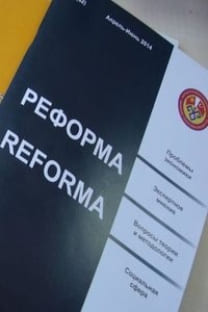SOCIAL NORMS AND TAX CULTURE IN TRANSITION ECONOMIES: THE CASE OF KYRGYZSTAN
Taxes are the main financial resource of government. Government use deterrence instruments as tax penalty and detection to increase tax compliance. However willingness to pay taxes or tax morale too has substancial influence on tax behavior. At the same time political, demographic and pchychologyc factors affect the level of tax morale. In this study effect of social norms on tax moral investigated using ordered probit model. Results showed that social norms have a significant effect on tax morale.
Anahtar Kelimeler:
tax, tax morale, social norms
SOCIAL NORMS AND TAX CULTURE IN TRANSITION ECONOMIES: THE CASE OF KYRGYZSTAN
Taxes are the main financial resource of government. Government use deterrence instruments as tax penalty and detection to increase tax compliance. However willingness to pay taxes or tax morale too has substancial influence on tax behavior. At the same time political, demographic and pchychologyc factors affect the level of tax morale. In this study effect of social norms on tax moral investigated using ordered probit model. Results showed that social norms have a significant effect on tax morale.
Keywords:
tax, tax morale, social norms,
___
- Adams, Ch. For Good and Evil: the Impact of Taxes on the Course of Civilization. – London: Madison Books, 1994.
- Alm, J., McClelland, G. H., Schulze, W. D. Changing the Social Norm of Tax Compliance by Voting // International Review of Social Sciences. – 1999. – No.52(2). – P. 141-171.
- Cummings, R. G., Martinez-Vazquez, J., McKee, M., Torgler, B. Effects of Tax Morale on Tax Compliance: Experimental and Survey Evidence. Center for Research in Economics, Management and the Arts // Working Paper. – 2005. – No.29.
- De Juan, A., Lasheras, M.A. and Mayo R. Voluntary compliance and behavior of Spanish taxpayers. – Madrid, Spain: Instituto de Estudios Fiscales, 1993.
- Elster, J. The Cement of Society: A Study of Social Order. – Cambridge: Cambridge University Press, 1989.
- Frey, B. S. Not Just for Money: An Economic Theory of Personal Motivation, – Cheltenham, UK and Lyme, USA: Edward Elgar, 1997.
- Grasmick, H. G., Bursik, R. J. and Cochran, J. K. Render Unto Caesar What Is Caesar’s: Religiosity and Taxpayers’ Inclinations to Cheat // Sociological Quarterly. – 1991. – No.32. – P. 251-266.
- Kirchler, E., Hölzl, E. & Wahl, I. Enforced versus voluntary compliance: the “Slippery Slope” Framework // Journal of Economic Psychology. – 2008. – No.29. – P. 210-25.
- Lewis, A. An empirical assessment of tax mentality // Public Financ. –1979. – No.2. – P. 245-257.
- Lewis, H. B. Shame and Guilt in Neurosis. – New York: International University Press, 1971.
- Nerre, B. Tax Culture as a Bacic Concept for Tax Policy Advice // Journal of Economic Society of Australia. – 2008. – No.38(1). – P. 153-167.
- Pollinsky, M. A. and Shavell, S. The economic theory of public enforcement of law // Journal of Economic Literature. – 2000. – No.38. – P. 1155-1186.
- Schmölders, G. Genel Vergi Teorisi. (Çev.) Salih Turhan. İÜ Yay. İstanbul, 1976. No.2149.
- Scholz, J. T. and Pinney, N. Duty, Fear and Tax Compliance: The Heuristic Basis ofCitizenship Behavior // American Political Science Review. –1995. – No.77. – P. 55-74.
- Torgler, B. Tax Compliance and Tax Morale: A Theoretical and Empirical Analysis. 2007.
- Tosuner, M. ve Demir, İ. Toplumsal Bir Olgu Olarak Vergi Ahlakı // Gazi Üniversitesi İktisadi ve İdari Bilimler Fakültesi Dergis. – 2007. – No.9(3). – P. 1-20.
- Wenzel, M. An Analysis of Norm Processes in Tax Compliance // Journal of Economic Psychology 2004. – Vol.25(2). – P. 213-228.
- Юткина, Т. Ф. Налоги и налогообложение. – Москва: ИНФРА-М, 1998. – 429 с.
- ISSN: 1694-5158
- Yayın Aralığı: Yılda 2 Sayı
- Başlangıç: 1999
- Yayıncı: Kırgızistan Türkiye Manas Üniversitesi
Sayıdaki Diğer Makaleler
INTER-SECTORAL RELATIONS IN THE ECONOMY OF KYRGYZSTAN FOR THE 2005-2015 PERIOD
SOCIAL NORMS AND TAX CULTURE IN TRANSITION ECONOMIES: THE CASE OF KYRGYZSTAN
KIRGIZİSTAN’DA ÖZNEL REFAH VE GÜVENLİK
Mahmut ERDOĞAN, Ainura TURDALIEVA, Razia ABDIEVA
TIME TO REFORM ENERGY INDUSTRY GOVERNANCE
Valentina KASYMOVA, Azat ISHENALIEV, Venera ABDYKADYROVA
HISTORICAL MEMORY DOES NOT AGE
TOURISM AS A SYSTEM AND ITS SUSTAINABILITY
CHINA’S REGIONAL POLICY IN CENTRAL ASIA AND PARTNERSHIP WITH KYRGYZSTAN
Kanyshai MUKTAROVA, Kyialbek ABIBULLA UULU
A STUDY ON MISSION STATEMENTS OF THE MEMBERS OF THE KYRGYZ ASSOCIATION OF TOUR OPERATORS (KATO)
